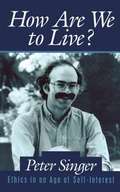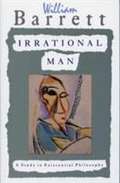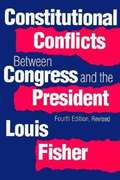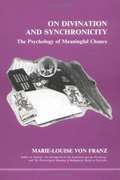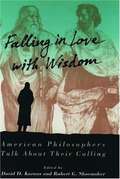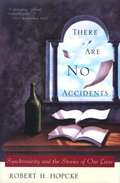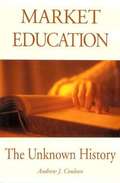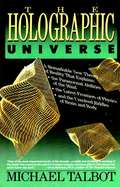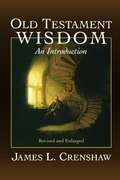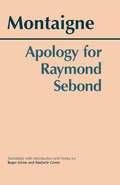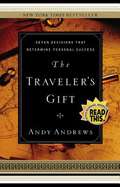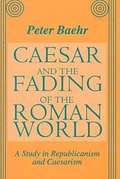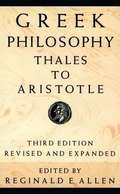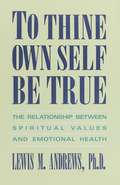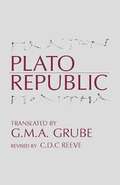- Table View
- List View
The Shield of Achilles: War, Peace, and the Course of History
by Philip BobbittHistory of war and international relations with commentary and theses.
How Are We to Live?: Ethics in an Age of Self-Interest
by Peter Singerrefutes the idea that humans are by nature selfish; powerful call to live an ethical life.
Irrational Man: A Study in Existential Philosophy
by William BarrettWidely recognized as the finest definition of existentialist Philosophy, this book introduced existentialism to America in 1958. Barrett discusses the views of 19th and 20th century existentialists Kierkegaard, Nietzsche, Heidegger, and Sartre and interprets the impact of their thinking on literature, art, and philosophy.
Constitutional Conflicts between Congress and the President
by Louis FisherThis text covers issues relating to conflicts between congress and the President. The scan is in tact, but has numorous footnotes, so the reader needs to be aware of these at the botton of each page.
The Interpretation of Nature and the Psyche
by Wolfgang Pauli C. G. JungJung's original essay on synchronicity and Pauli's view as a physicist of archetypes and synchronicity.
Supreme Command: Soldiers, Statesmen and Leadership in Wartime
by Eliot A. CohenDiscussion of how statesmen and the military should interact.
On Divination and Synchronicity
by Marie-Louise von FranzJung's leading disciple studies synchronicity, or meaningful coincidences, using ancient oracular techniques and texts.
Falling in Love with Wisdom: American Philosophers Talk about Their Calling
by David D. Karnos Robert G. Shoemaker64 memoirs reveal that the road to wisdom has many on-ramps.
Just War Against Terror: The Burden of American Power in a Violent World
by Jean Bethke ElshtainAnalysis of the demands arising from the terror of 9-11.
The Last Days of Socrates
by Plato Hugh TredennickThe trial and condemnation of Socrates (469-399 BC) on charges of heresy and corrupting the minds of the young, forms a tragic episode in the history of Athens.
The Future of Freedom: Illiberal Democracy at Home and Abroad
by Fareed ZakariaWhat we need to do to maintain true democracy.
Talk of the Devil: Encounters with Seven Dictators
by Riccardo Orizio Avril BardoniFirst-hand accounts.
There are no Accidents
by Robert H. HopckeAn informal examination of Jung's theory of synchronoicity through the telling of stories.
The Roots of Coincidence
by Arthur KoestlerMr. Koestler has given us a lucid exposition of modern data as to space, time, matter, causality, neurophysiology and psychical research, out of which a remarkable synthesis emerges. His concept of "Janus-faced holons" may well prove as stimulating to our generation as was Bergson's Elan Vital to the thinkers of the early part of the century.
Market Education: The Unknown History (Studies in Social Philosophy & Policy, No. #21)
by Andrew J. CoulsonCoulson concludes that free educational markets have consistently done a better job of serving the public's needs than state-run school systems have. (from the publisher)
The Holographic Universe
by Michael TalbotThese relatively new data are of such far-reaching relevance that they could revolutionize our understanding of the human psyche, of psychopathology, and of the therapeutic process. Some of the observations transcend in their significance the framework of psychology and psychiatry and represent a serious challenge to the current Newtonian-Cartesian paradigm of Western science. They could change drastically our image of human nature, of culture and history, and of reality.
The Ethics of War and Nuclear Deterrence
by James P. SterbaA selection of addresses, essays and lectures on the moral and ethical aspects of war and the strategy of deterrence.
Old Testament Wisdom: An Introduction
by James L CrenshawThe title of the book can be pleasantly deceiving. Crenshaw goes well beyond the wisdom tradition found in the biblical books of Ecclesiates, Psalms, Proverbs, and Job. He takes a broader perspective and includes apocrapha writings as well as Egyptian and Mesopotamian literature. This is a very thorough, concise, and well orgainized book, much appreciated for students working under time constraints.
An Apology for Raymond Sebond
by Michel De Montaigne M. A. ScreechIn his introduction, Screech writes: "Montaigne gives his readers the fruits of his own wide reading and of his own reflections upon it, all measured against his personal experience during a period of intellectual ferment and of religious and political disarray. Montaigne never let himself be limited by his office or station. As husband, father, counsellor, mayor, he kept a critical corner of himself to himself, from which he could judge in freedom and seek to be at peace with himself. He does not crush his reader under the authority of the great philosophers: he tries out their opinions and sees whether they work for him or for others. Traces of Plato, Aristotle, Plutarch, Cicero, St Augustine or of his own contemporaries can be found in every page he wrote, but they are skilfully interwoven into his own discourse, being renewed and humanized in the process. And he hardly ever names them. An Apology For Raymond Sebond has all these qualities, despite its being the longest piece Montaigne ever wrote. In it, Montaigne remains triumphantly himself."
The Traveler's Gift: Seven Decisions that Determine Personal Success
by Andy AndrewsWHAT MAKES THE DIFFERENCE between failures AND SUCCESS? From the European theater of World War II to a warehouse in heaven, David encounters some of the wisest people who ever lived.
Questioning Matters: an Introduction to Philosophical Inquiry
by Daniel KolakQuestioning Matters is an accessible, provocative collection of readings organized around central topics that are solidly grounded in classical, foundational issues, but relevant to today’s world. Kolak’s compilation emphasizes philosophical reasoning processes and methods more than any other anthology. The focus is on learning to ask the right questions and to analyze and formulate arguments; an underlying theme is that philosophy is not merely a collection of views and theories, but an activity as relevant to the timeless issues of existence as the practical concerns of today.
Caesar and the Fading of the Roman World
by Peter BaehrA examination of 'Caesar' and Casearism in republican thought from his death until today.
Greek Philosophy: Thales to Aristotle (Third Edition)
by Reginald E. AllenEvery history of philosophy begins with Thales, and records with proper solemnity his opinion that the source of all things is water. And every beginning student is shocked. Not until he reaches Plato and Aristotle does he find himself in a world recognizably his own, a world whose science, law, and logic are of a type his own experience has made familiar. The pronouncements of philosophers are usually answers to questions, whether or not the questions are explicitly put. If Thales claimed that the source of all things is water, his question must presumably have been, What is the source of all things?
To Thine Own Self Be True: The Relationship Between Spiritual Values and Emotional Health
by Lewis M. Andrews"There is a newfound confidence and enthusiasm for living. But perhaps the most remarkable development of all is the recognition that this spiritual therapy is not really a new discovery, revealed by some outside authority, as much as it is a reminder of the basic truths we have always known in our own hearts. In healing ourselves, we learn that the greatest wisdom of all lies not in listening to others but in being true to our deepest selves".
Plato's Republic (Second Edition)
by G. M. A. Grube C. D. C. ReevePlato's famous musings about how society should function. The second edition of this translation.

